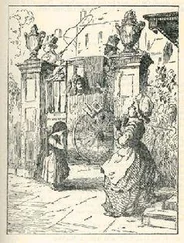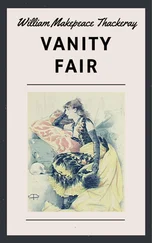Eleanor Brainerd - In Vanity Fair - A Tale of Frocks and Femininity
Здесь есть возможность читать онлайн «Eleanor Brainerd - In Vanity Fair - A Tale of Frocks and Femininity» — ознакомительный отрывок электронной книги совершенно бесплатно, а после прочтения отрывка купить полную версию. В некоторых случаях можно слушать аудио, скачать через торрент в формате fb2 и присутствует краткое содержание. Жанр: foreign_antique, foreign_prose, на английском языке. Описание произведения, (предисловие) а так же отзывы посетителей доступны на портале библиотеки ЛибКат.
- Название:In Vanity Fair: A Tale of Frocks and Femininity
- Автор:
- Жанр:
- Год:неизвестен
- ISBN:нет данных
- Рейтинг книги:5 / 5. Голосов: 1
-
Избранное:Добавить в избранное
- Отзывы:
-
Ваша оценка:
- 100
- 1
- 2
- 3
- 4
- 5
In Vanity Fair: A Tale of Frocks and Femininity: краткое содержание, описание и аннотация
Предлагаем к чтению аннотацию, описание, краткое содержание или предисловие (зависит от того, что написал сам автор книги «In Vanity Fair: A Tale of Frocks and Femininity»). Если вы не нашли необходимую информацию о книге — напишите в комментариях, мы постараемся отыскать её.
In Vanity Fair: A Tale of Frocks and Femininity — читать онлайн ознакомительный отрывок
Ниже представлен текст книги, разбитый по страницам. Система сохранения места последней прочитанной страницы, позволяет с удобством читать онлайн бесплатно книгу «In Vanity Fair: A Tale of Frocks and Femininity», без необходимости каждый раз заново искать на чём Вы остановились. Поставьте закладку, и сможете в любой момент перейти на страницу, на которой закончили чтение.
Интервал:
Закладка:
Even could one conceive of all the great French dressmakers transplanted to another land, only in Paris could the modes be successfully launched, for only there can monsieur find the women who are ready and able to carry off triumphantly even the most revolutionary of creations, who have the courage and confidence to exploit models strikingly novel – always provided those models have beauty and cachet to commend them. It is the Parisienne, too, who is willing to buy the most extravagantly fragile and perishable of frocks and who will wear them regardless of consequences; who will, moreover, smile most cheerfully when, having fulfilled its mission, the costly frock is crushed, drabbled, ruined.
"It had un succès fou , M'sieu!" she says blithely to the maker when she sees him next. That is quite enough. A great success on one occasion justifies any extravagance, and why allow a spoiled frock to obscure an agreeable memory?
King Alfonso attended one of the famous race meetings near Paris one day last summer, and all the smart Parisian world turned out to do him honour. The display of frocks and millinery was a notable one. The pesage was crowded with women in the airiest and most elaborate of summer toilettes and, suddenly, the heavens opened and a torrent of rain poured down. Such a scurrying and twittering; such little moans and shrieks; such laughter and jesting! Bad temper? Not a bit of it. Things were quite bad enough without losing one's temper. So they chatted and joked and achieved bon mots that almost reconciled them to the facts that their rouge was streaked and their plumes were drabbled and their curls were straggling and their frocks were limp. The sun came out and the demoralized toilettes emerged from under cover, mere wrecks of their former beauty; but the wearers carried the situation off with a good-natured vivacity to which no other women would have been equal. The afternoon was a particularly gay one, and the prevailing philosophy was voiced by one little countess who was heard to say to a friend as they stood waiting for their automobiles:
"The frocks are spoiled, absolutely spoiled. C'est dommage, – but, ma chère, what an opportunity for the petticoats and the feet, n'est-ce pas? Me, – I found much consolation in the real lace in my white stockings and in my new shoe buckles, – Va! One sees, every day, the frocks. To-day, for the first time, I know intimately the ankles of all my friends."
Possibly the countess gave her maid a bad quarter hour after she reached home; but for the benefit of the public she stood there, insouciant, smiling, debonair, with her chiffon frock clinging forlornly to her shapely little figure, with her tulle hat gummed to a disarranged coiffure and its plumes drooping like funeral emblems over her left ear, but with her spirits intact. Not for nothing did she have some of the best blood of France in her veins. It is sporting blood, – that best blood of France.
Concerning the morals of French womankind, the serious may write, – and the less they know about Paris – provided they are Anglo-Saxon – the more fluently they will write; for intimate acquaintance with Parisian life and sentiment is sadly prejudicial to orthodox Anglo-Saxon standards, and it is difficult to be severe with the Parisienne if one knows her. One disapproves of her, in certain of her phases, perhaps, but one learns the tolerant shoulder shrug of her nation. She is so very amusing, and Paris is, first of all, "le monde où l'on s'amuse."
One may like Paris or not. One may choose to live in Paris or to live elsewhere, but one thing the fair-minded will all admit. This capital city of the kingdom of Vanity Fair is gay. The Parisians have reduced gaiety to a science, luxury to an art. There may be tragedy behind the curtain; but, before the public, life goes to a merry tune. It is quite possible that smart society, the world over, is as rotten as our novelists, dramatists, and preachers would have us believe; but, at least, in Paris it is not dull. Where American smart society is spectacular, French smart society is chic. Even in the half world the distinction holds. The demi-mondaine of New York – or the nearest approach to the demi-mondaine which New York furnishes, for our standards are uncompromising and we recognize no "half world" – is vulgar. The demi-mondaine of Paris is – one can but have recourse once more to that untranslatable comprehensive word "chic."
Immorality, we are solemnly assured, is none the less immoral because it is not banal. Probably it is more deplorable in proportion as it takes on attractiveness; but we are not moralizing, merely stating facts, and the fascination of the great Parisian demi-mondaine is a well-established fact.
To begin with, she is the best dressed woman in the world. Any of the famous dressmakers of Paris, who are the world's arbiters of fashion, will tell you that. She has the money and the taste, and with her, even more than with the Parisienne of the beau monde, being charming is a metier. She supplements natural attractions with every resource of art. She is, as a rule, clever, tactful, witty. Often she is brilliant, and the nearest approach to the famous salons of old France are to be found to-day in the homes of certain Parisiennes who are frankly demi-mondaine or dwell in that middle world twixt "beau" and "demi" where, sometimes, the name "artiste" casts a broad mantle of charity over irregularity of life. There are countesses and princesses of the blood who play at salon making in Paris, and who would be in the seventh heaven could they once call under their roofs the famous men who flock to certain salons where mesdames of the beau monde may not follow. Great litterateurs, painters, sculptors, musicians, scientists gather at certain informal evenings, certain famous little dinners. And mark you, everything here is comme il faut – yes, indeed. Let the student of morals who associates the phrase demi-mondaine only with Tenderloin orgies revise his vocabulary. Orgies of the familiar kind he can find in Paris. They are easily found; but he will have considerable difficulty in gaining admittance to the salon of the great artiste whose life history has been, to put it mildly, unconventional, or to the salon of the famous demi-mondaine. Once admitted, he will need wit and worldly wisdom to hold his own. One hears of little dinners where the quantity of liquor drunk falls far below Tenderloin standards, but where the poet of the moment composes sonnets to his hostess's eyebrow; where the famous composer replies to Madame's "A new song, mon chèr. I must have a song all my own," by sitting down at the piano and working out a chanson which all Paris will be whistling a few months later; where the petted tenor from the Opera sings street ballads, and the great diplomat chats international scandal, and the successful artist and feminist sketches portraits of his hostess upon the fly-leaf of the autograph copy of the academician's book which the author has just presented to her.
Yes; one hears of those happenings in the little house at Neuilly or in the mansion on the Boulevard Malesherbes, or wherever the rendezvous may be, and one struggles vainly to adjust one's vision to the Parisian perspective to understand the Parisian attitude toward life. It is disturbing to find impropriety so devoid of the lurid light in which melodrama pictures it. One's moral vertebra softens in Paris.
But there are Parisiennes and Parisiennes. There is the aristocrat of the St. Germain – and even aristocratic virtue is not dull in Paris. There is the wife of the millionaire tradesman. There are the women folk of the great banking house. There are the ladies of the diplomatic circle, there are exiled queens and resident grand duchesses. There are the Americans. There are the artistes. There are the demi-mondaines, the cocottes. And there is Mimi. She is not the worst of the group, this unimportant little Mimi, not the worst, and by no means the least coquette; but she is not a bird of fine feathers and does not belong in our story.
Читать дальшеИнтервал:
Закладка:
Похожие книги на «In Vanity Fair: A Tale of Frocks and Femininity»
Представляем Вашему вниманию похожие книги на «In Vanity Fair: A Tale of Frocks and Femininity» списком для выбора. Мы отобрали схожую по названию и смыслу литературу в надежде предоставить читателям больше вариантов отыскать новые, интересные, ещё непрочитанные произведения.
Обсуждение, отзывы о книге «In Vanity Fair: A Tale of Frocks and Femininity» и просто собственные мнения читателей. Оставьте ваши комментарии, напишите, что Вы думаете о произведении, его смысле или главных героях. Укажите что конкретно понравилось, а что нет, и почему Вы так считаете.












